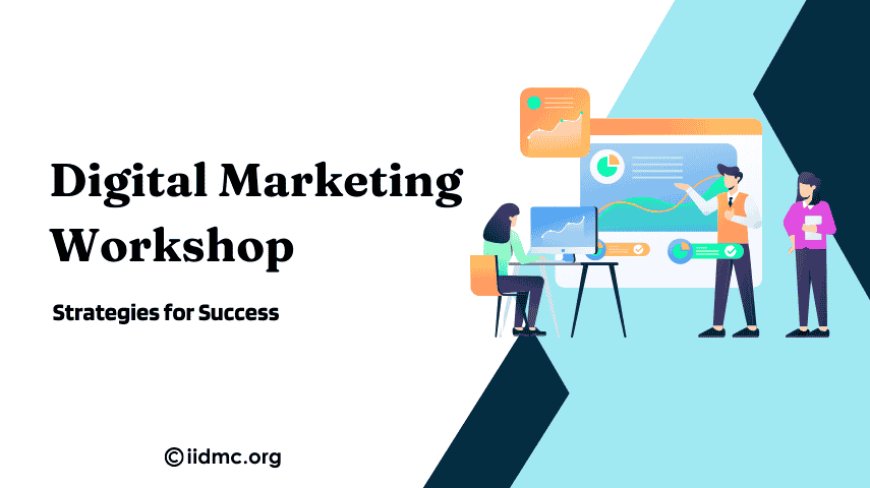Digital Marketing Workshop: Strategies for Success
Master digital marketing strategies for success in our workshop, covering essential tools and techniques to grow your online impact

What is digital marketing?
Digital marketing refers to the use of online platforms and technologies to promote products, services, or brands. It involves a variety of strategies, such as social media marketing, search engine optimization (SEO), content marketing, email campaigns, and online advertising, all aimed at reaching a wide audience through digital channels like websites, mobile apps, and social media platforms.
This type of marketing allows businesses to connect with potential customers more directly and cost-effectively. By using data and analytics, digital marketing can be highly targeted and personalized, making it easier for companies to measure their success and adjust strategies in real time.
Importance of Digital Marketing
-
Wider Reach: With billions of users active online, digital marketing allows businesses to target global markets with ease, breaking geographical barriers.
-
Cost-effective: Compared to traditional marketing methods like TV ads or billboards, digital marketing offers more affordable options, especially for small businesses.
-
Measurable Results: Digital marketing campaigns provide instant feedback through analytics, allowing businesses to measure their success and adjust strategies as needed.
-
Engagement: It facilitates two-way communication, enabling businesses to interact with their customers, respond to inquiries, and build meaningful relationships.
-
Better Targeting: Digital marketing allows for highly targeted campaigns, ensuring your message reaches the right audience based on demographics, interests, and behavior.
Stay Ahead of the Curve with the Latest Trends
The digital marketing landscape is constantly evolving. What worked a few months ago may no longer be effective today. Workshops are designed to provide you with insights into the latest trends in the industry, so you can stay competitive. Key trends for 2025 include:
-
AI and Automation: Learn how artificial intelligence is transforming digital marketing through personalized recommendations, automated campaigns, and chatbots.
-
Video Marketing: Short-form videos, live streaming, and interactive video content are gaining more attention across platforms like TikTok and YouTube.
-
Voice Search Optimization: With the rise of voice-activated devices, optimizing for voice search has become increasingly important.
-
Influencer Marketing: Partnering with influencers allows businesses to reach a wider audience authentically and engagingly.
-
Social Commerce: Social media platforms are now integrated with shopping features, enabling direct sales from posts.
Key Topics Covered in the Digital Marketing Workshop
Our Digital Marketing Workshop: Strategies for Success is designed to provide a comprehensive understanding of how digital marketing works and how you can apply these strategies to grow your business. Here’s a sneak peek at the key topics covered:
-
SEO Best Practices: Learn how to optimize your website to rank higher on search engines, driving organic traffic and improving visibility.
-
Social Media Marketing: Explore the latest social media platforms, content strategies, and how to build a strong brand presence online.
-
Content Marketing: Discover the power of content and how to create valuable, engaging material that resonates with your audience.
-
Email Marketing: Understand the art of crafting effective email campaigns that convert and nurture customer relationships.
-
Paid Advertising: Gain insights into pay-per-click (PPC) strategies and how to run successful Google Ads and social media campaigns.
-
Analytics and Reporting: Learn how to track your digital marketing performance and make data-driven decisions for better results.
Benefits of Attending the Workshop
-
Hands-On Experience: The workshop is not just about theory. You will get to apply what you learn through practical exercises, case studies, and real-world examples.
-
Expert Guidance: You will be taught by industry experts who bring years of experience in digital marketing, offering valuable insights and tips.
-
Networking Opportunities: Connect with like-minded professionals, entrepreneurs, and business owners. Collaborating with peers can lead to new ideas and partnerships.
-
Improved Skill Set: Whether you're new to digital marketing or looking to refine your skills, this workshop will help you gain the knowledge you need to stay ahead of the curve.
-
Increased ROI: By mastering the latest digital marketing techniques, you’ll be able to run more effective campaigns, leading to higher returns on investment.
-
Certification: Upon completion, you will receive a certificate that adds value to your professional profile and demonstrates your expertise in digital marketing.
What We Discuss in the Workshop
Interactive Sessions and Live Demonstrations
-
Practical Demos: Host live demonstrations on how to set up campaigns across different platforms (Google Ads, Facebook Ads, Instagram, etc.). This hands-on approach will make participants feel more comfortable with the tools.
-
Interactive Q&A: After each session, include an interactive Q&A where participants can ask specific questions about their challenges and get expert advice.
Case Studies of Successful Campaigns
-
Real-World Success Stories: Share case studies of businesses that have successfully leveraged digital marketing strategies. This helps participants see how the concepts taught can be applied practically and effectively.
-
Failure Analysis: Include a few examples of campaigns that didn’t work and discuss why they failed and what could have been done differently. This helps participants learn from others' mistakes.
Personalized Digital Marketing Strategy Creation
-
Workshop on Crafting a Custom Plan: Provide a session where participants create their digital marketing strategies tailored to their specific business needs. This could involve segmenting target audiences, choosing the right platforms, and setting campaign objectives.
-
Peer Reviews: Allow participants to share their strategies with peers and get feedback to improve their plans.
Emerging Technologies in Digital Marketing
-
Blockchain in Digital Advertising: Introduce how blockchain technology is making strides in digital advertising and data privacy.
-
Augmented Reality (AR) and Virtual Reality (VR): Discuss how AR/VR is becoming integrated into digital marketing campaigns, especially in the fashion, real estate, and automotive industries.
Local SEO and Hyperlocal Marketing
-
Local SEO Tactics: Teach how to optimize for local search, an essential strategy for small businesses or those with physical stores. Include tips on Google My Business, local backlinks, and geo-targeting.
-
Hyperlocal Targeting: Explain how to create campaigns that target very specific locations, especially for businesses with a local presence.
Influencer Marketing Strategy
-
Choosing the Right Influencers: Teach participants how to identify influencers who align with their brand values and target market.
-
Measuring Influencer ROI: Provide insights into tracking and measuring the return on investment (ROI) when working with influencers, which can often be difficult to quantify.
Customer Retention and Loyalty Programs
-
Building Customer Loyalty: Explore strategies to retain customers, such as personalized email marketing campaigns, loyalty programs, and customer service best practices.
-
Lifecycle Marketing: Discuss the customer lifecycle and how to design campaigns that nurture customers from awareness to retention and advocacy.
Workshops on Specific Platforms
-
Platform-Specific Deep Dives: Offer additional focused sessions for specific platforms like Instagram, LinkedIn, or Pinterest, discussing strategies tailored to those platforms.
-
Influence of Emerging Platforms: Look into newer platforms that are gaining popularity, such as TikTok, and discuss the opportunities they present for digital marketers.
Building an Effective Content Calendar
-
Planning and Scheduling: Teach how to build a content calendar that aligns with business goals, seasonal trends, and target audience behavior. Provide templates for planning.
-
Content Creation Tools: Introduce tools that make content creation easier, such as Canva for design, Hootsuite or Buffer for scheduling, and BuzzSumo for content research.
Building an Online Community
-
Community Engagement: Discuss the importance of building an online community (e.g., on Facebook Groups or Discord) to foster engagement and loyalty.
-
User-Generated Content (UGC): Teach strategies for encouraging and leveraging UGC to build trust and authenticity with your audience.
Industry Requirements for Digital Marketing
Digital marketing professionals need a mix of technical skills and creativity, including:
-
Expertise in various channels like SEO, PPC, social media, and content marketing.
-
Strong analytical skills to interpret data and optimize campaigns using tools like Google Analytics.
-
Familiarity with emerging technologies such as AI, voice search, and augmented reality (AR).
-
Ability to create engaging content and adapt to new trends.
-
Knowledge of local SEO and customer retention strategies.
-
Understanding of compliance with data privacy regulations like GDPR.
-
Effective communication and collaboration skills to work across teams.
Future of Digital Marketing
The future of digital marketing is shaped by innovation and consumer demands, including:
-
AI and Automation: Personalized marketing with AI-driven tools for smarter campaigns and automation.
-
Voice Search: Optimization for voice-activated devices as voice search grows.
-
Video Content: Increasing use of short-form and live video across platforms like TikTok and YouTube.
-
AR/VR: Immersive experiences for e-commerce and marketing.
-
Influencer Marketing: Focus on micro-influencers for more authentic engagement.
-
Social Commerce: Direct shopping via social media platforms.
-
Data Privacy: A stronger focus on privacy, transparency, and trust in digital marketing.
-
Personalization: hyper-personalized experiences powered by data and AI.
This workshop offers key skills to help you stay current, develop effective strategies, and achieve success in a dynamic and evolving environment.
If you need information on any topic, feel free to mention it, and I'll provide the details



























